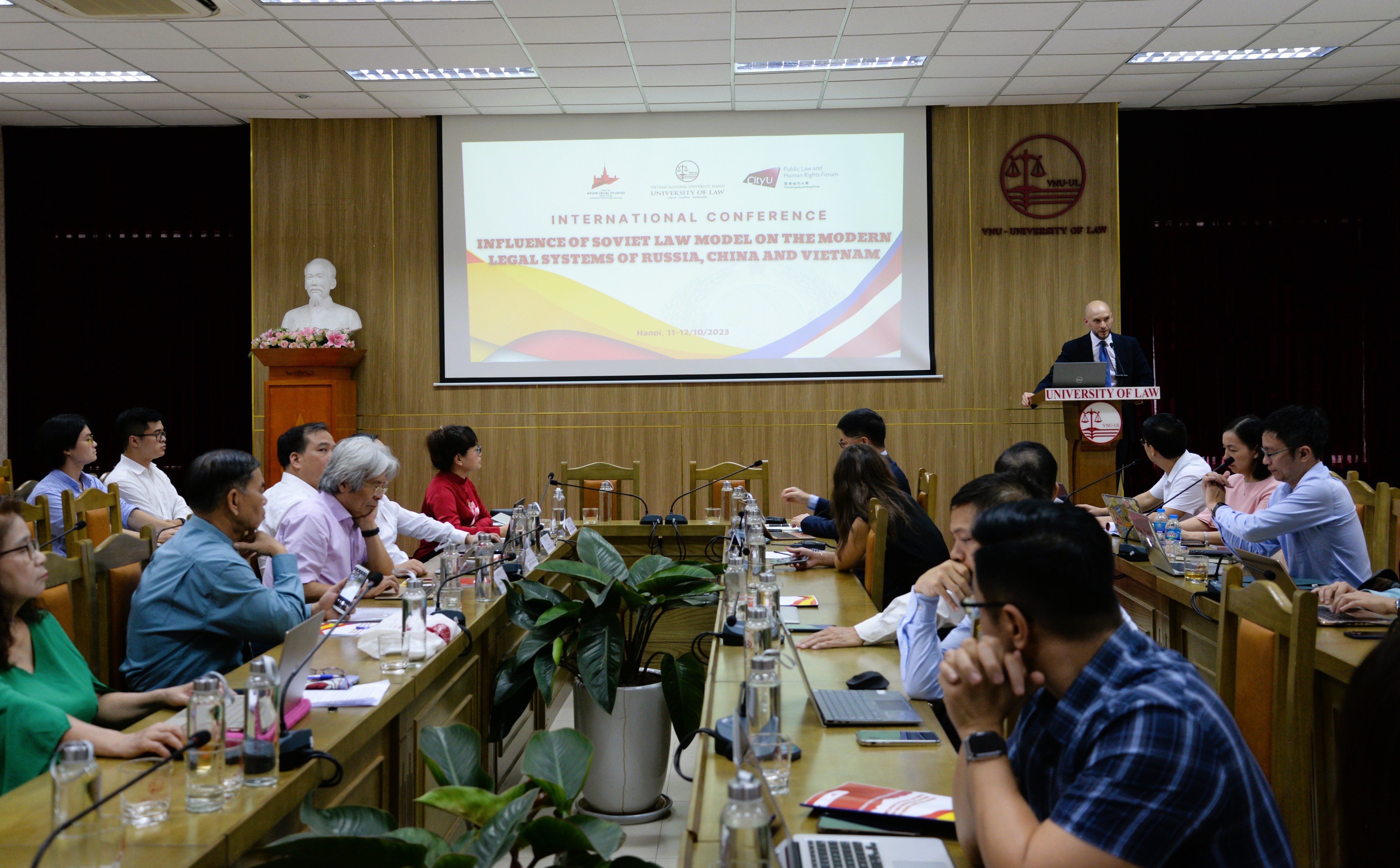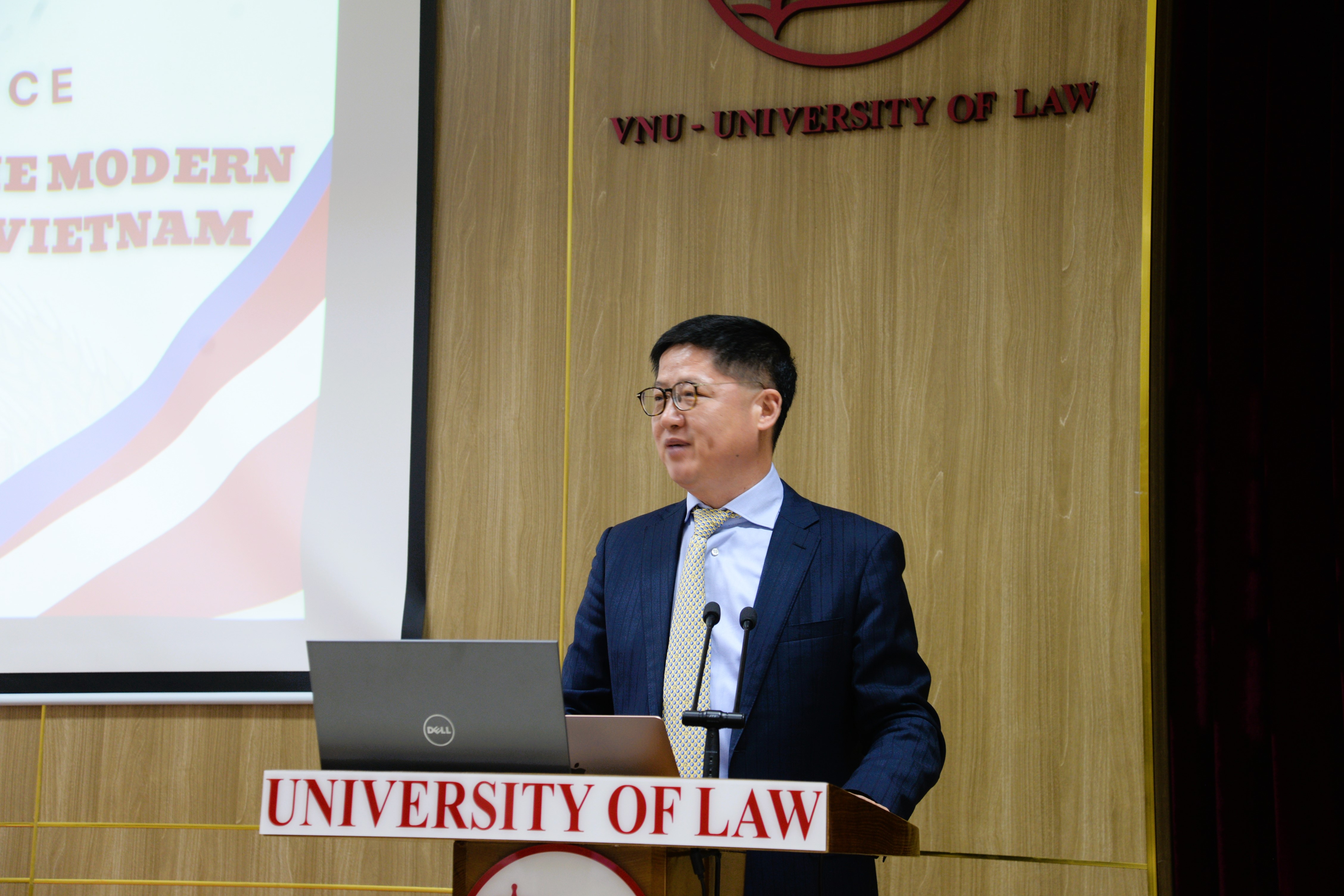On
October 11-12, 2023, the VNU University of Law, the Faculty of Law, Lomonosov
Moscow State University, and the School of Law, City University of Hong Kong
co-organized the international conference "The Influence of the Soviet law
model on the modern legal systems of Russia, China and Vietnam". The
conference is a forum for scholars, managers, and researchers to exchange and
share their research on the influence of the Soviet legal model on countries
such as Russia, China, and Vietnam. Overview
of the Conference
On behalf of the University of Law, VNU, the following individuals attended the conference: A.Prof.Dr. Nguyen Thi Que Anh (Rector); Dr. Nguyen Trong Diep (Chairman of the University Council); A.Prof.Dr. Trinh Tien Viet (Vice Rector); and leaders of the University's Faculties and Centers, lecturers, students, and postgraduate students. In addition, the conference included the participation of many leading experts such as Prof. Dr. Vo Khanh Vinh, Professor, Ph.D. Le Minh Tam, Professor, PhD. Hoang Thi Kim Que, Professor, Ph.D. Pham Hong Thai, Prof. Dr. Nguyen Dang Dung, Lieutenant General Assoc. Prof. Dr. Tran Van Do, PhD. Nguyen Van Thanh, Associate Professor, PhD. Nguyen Tat Vien; …. Regarding foreign experts, the VNU University of Law was honored to welcome Professor. Guobin Zhu (Director of the Center for Public Law and Human Rights, School of Law, City University of Hong Kong); Associate Professor, PhD. Alexander Molotnikov (Director of the Asian Law Center, Faculty of Law, Lomonosov Moscow State University; Associate Professor, PhD. Konstantin Lubenchenko (Lecturer at the Faculty of Law, Lomonosov Moscow State University, Former Chairman of the Federal Council of the Supreme Soviet of the USSR (1991)); Prof. Dr. Eygeny Gubin (Head of Department of Business Law, Faculty of Law, Lomonosov Moscow State University, Meritorious Scientist of the Russian Federation); Prof.Dr. Alexey P. Albov (Head of the Department of Legal Theory, State and Comparative Jurisprudence, Russian University of Social Sciences and Humanities); Prof. Dr. Science. Damir Salikhov (Russian Federal University of Higher Studies of Economics); GS. Zhiyuan Guo (China University of Political Science and Law); Associate Professor, PhD. Dmitrii Dedov (Lomonosov Moscow State University); Dr. Luong Thanh Hai (School of Social Sciences, University of Queensland, Australia); Associate Professor, PhD. Ran Lu (School of Law, Soochow University, Taiwan); Associate Professor, PhD. Aleksandr Pishchulin (Faculty of Law, Lomonosov Moscow State University) ... along with many other renowned experts from all 3 countries.
 Associate
Professor, Dr. Nguyen Thi Que Anh speaks at the Conference
Speaking at the Conference, Associate Professor, Dr. Nguyen Thi Que Anh expressed her thanks to the scholars who were present at the VNU University of Law to attend the international conference "The influence of the Soviet law model on the modern legal systems of Russia, China and Vietnam". Commenting on the topic of the Conference, the Rector said, "The Soviet legal model was born and developed in the former Soviet Union, then was introduced and had a great influence in the system of socialist states at that time.". To this day, the Soviet law model continues to influence the modern legal systems of Vietnam, Russia, and China. It has impacted the development trend of law in the context of globalization, integration, and innovation in these countries. Comparing and researching legal systems that have been influenced by Soviet law is meaningful in drawing lessons for Russia, China, and Vietnam, and at the same time contributing to research on legal transplantation and legal reform in general.  
During the 2 days of the conference, with 5 sessions and 20 presentations, scholars discussed and clarified many issues related to the origin and influence of the Soviet law model on the world. Session 1 was titled "The Influence of the Soviet law model: Origins and characteristics". In this session, scholars discussed a number of key issues such as the systematic advantages of the Soviet law system; the impact of Soviet law on Asian countries, including Vietnam; and... In session 2 with the topic "The impact of the Soviet law model on legal thought, legal sources, and the judicial system", the authors focused on clarifying systemic issues and clear impacts of the Soviet legal system on the judicial system, State Theory & Law in Vietnam, ... Session 3, Public Law experts from all three countries focused on analyzing the effects of the Soviet law model on Constitutional Law and Administrative Law. Some outstanding presentations include Soviet DNA in the contemporary Chinese Constitution through the lens of two concepts and one institution (Prof. Guobin Zhu); Constitution of Vietnam - From the influence of the Constitution of the Soviet Union and Eastern European socialist countries to the promulgation of the 2013 Constitution (Prof. Dr. Nguyen Dang Dung); The influence of Soviet administrative law science on Vietnamese administrative law science (Prof. Dr. Pham Hong Thai). Session 4: The influence of the Soviet law model on Criminal Law, revolving around the content of criminology, the principle of presumption of innocence, the influence of the Soviet law model on the Criminal Procedure Law; … Session 5: Influence of the Soviet law model on Civil Law, Business Law, Labor Law and Land Law with outstanding presentations: Impact of Soviet Law on Vietnamese Civil Procedure Law ( Dr. Nguyen Bich Thao); SEV block - Soviet-style economic cooperation model (Assoc. Prof. Dr. Vu Cong Giao; PhD. Nguyen Manh Tuan); Comparative research on land ownership laws in the Soviet Union, Russia, China and Vietnam (Assoc. Prof. Dr. Bui Anh Thuy).
Giving a closing speech, Associate Professor, PhD. Dang Minh Tuan commented, "In my opinion, the Conference was a great success because of the attraction it created for a large number of scholars, students, postgraduate students, and most importantly, The conference has suggested many issues that we need to continue expanding research in the future." Associate Professor also expressed his sincere thanks to the experts who participated in the Conference, especially the foreign experts who braved long travel to attend the Conference in person.
|